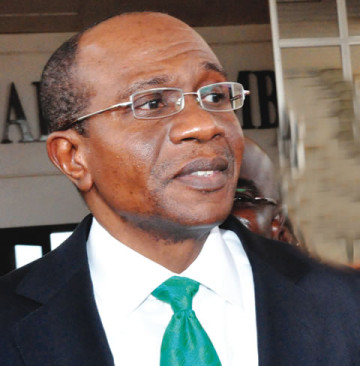
* Governor says jobs, poverty reduction the goals (Adds central bank governor comments)
Nigeria’s central bank has curbed access to the interbank currency market for investors wanting to buy foreign currency bonds and for importers bringing in a wide range of goods from rice to toothpicks.
The bank, seeking to conserve its dollar reserves, said on Wednesday that importers could no longer get hard currency from the interbank market to buy 41 items including rice, cement, private jets, steel products, plastics and rubber, soap, cosmetics, furniture and Indian incense.
Analysts said the measures risked diverting dollar demand to the black market, worsening investor perceptions about policy in Africa’s biggest economy and delaying a decision to devalue the naira to fully reflect weak prices for Nigeria’s oil exports.
“We see this policy move as confirmation that FX supply remains extremely tight. But more worryingly, it suggests that the central bank remains reluctant to devalue the naira,” said Yvonne Mhango, sub-Saharan Africa economist at Renaissance Capital.
JP Morgan has warned it might remove Nigeria from its Government Bond Index (GBI-EM) if does not restore liquidity to currency markets in a way that allows foreign investors tracking its benchmark to trade with minimal hurdles.
The naira, which was trading at 198.50 on the interbank market, sold for 220 against the dollar on the black market in the commercial capital Lagos on Wednesday.
Nigerian currency and bond markets have come under pressure since the oil price plunged last year. The central bank has spent $3.4 billion to prop up the naira since it fixed the exchange rate in February and tightened trading rules to curb speculation.
CAPITAL CONTROLS?
Central Bank Governor Godwin Emefiele told a news conference the measures announced on Wednesday were driven by a long-held desire to curb imports of goods that could be produced locally, both to create jobs and protect foreign currency reserves.
However, he shied away from questions on the potential impact on the currency and the interbank market.
“We are not very sure that it will impact parallel markets,” he said. “We are going to look at it again.”
Central bank officials met chief executives and treasurers from commercial lenders last week to discuss the impact of its policies on the foreign exchange market, but stopped short of announcing any decisions on how to make the naira more liquid.
The bankers suggested in the meeting that the central bank should adopt a free-float regime in addition to raising interest rates to attract offshore investors back into bonds, two people who attended the meeting told Reuters.
The central bank, which declined to comment, has said previously that floating the currency was not an option.
Wednesday’s “sudden change in policy underlines the difficulties the central bank is facing in managing FX reserves, which points to possibly greater exchange rate policy changes to come,” Angus Downie, head of economic research at Ecobank said.
In April, the central bank limited the amount bank customers could spend using debit cards abroad.
One trader at a major commercial bank told Reuters that pent-up demand for dollars in Nigeria was about $4 billion.
“The decision to in effect introduce additional capital controls does not bode well in relation to investor perception and may also adversely affect domestic business operations and costs,” said Cobus de Hart at NKC Africa Economics.
